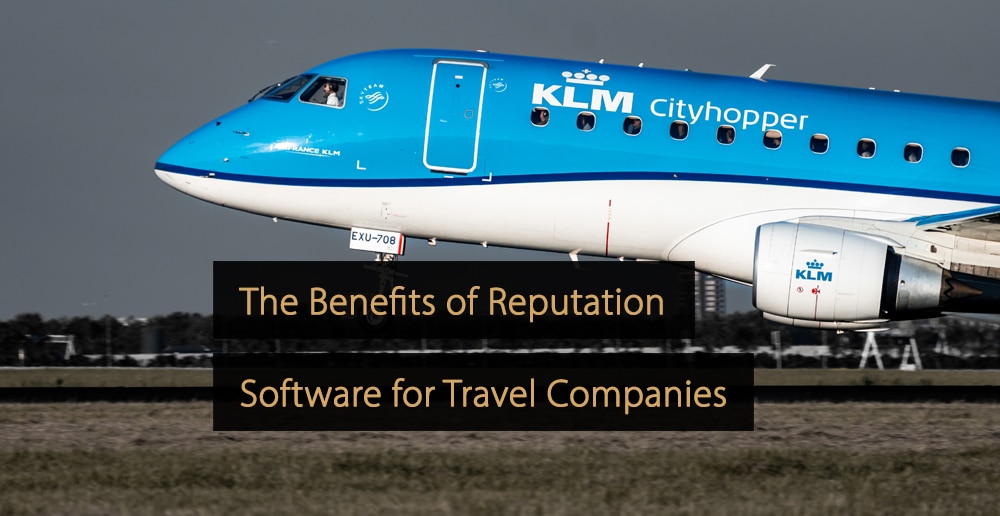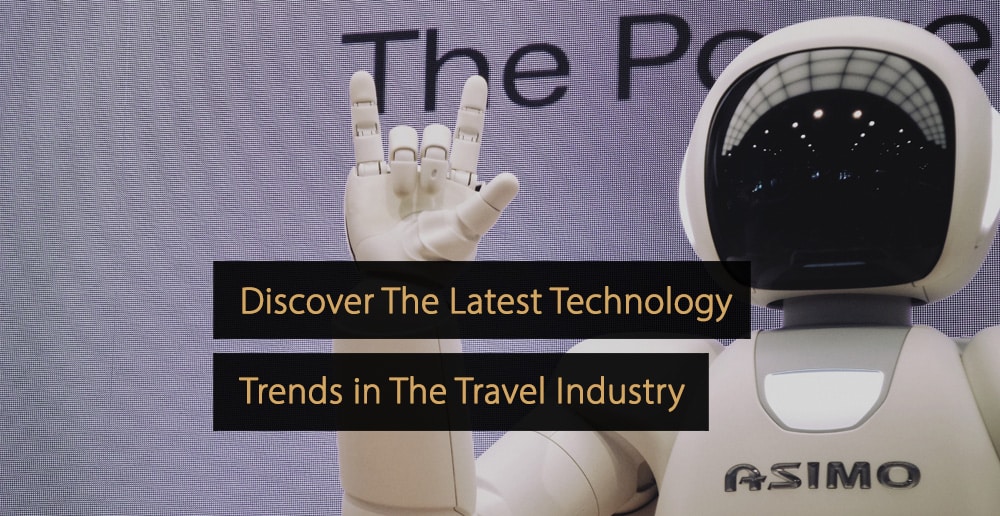Companies operating in the travel and tourism industry can live or die based on their online reputation. For this reason, a reputation management strategy is crucial, and reputation management software can play a major role in achieving sustainable business success. Here, you will find out more about the importance of a good reputation, the value of high-quality reputation software packages, and the main features you should look out for.
Table of Contents:
- Understanding the Word ‘Reputation’
- The Importance of Reputation Management
- What is Reputation Management Software?
- Which Travel Industry Companies Should Use Reputation Software?
- What Are the Benefits of Reputation Management Software?
- What Features Should Reputation Management Software Have?
- Review Management Tips for Travel Companies
- More Travel & Tourism Technology Tips
Understanding the Word ‘Reputation’
A simple definition of ‘reputation’ is the general beliefs or views people have about something or someone. Essentially, all the different opinions that exist combine to form a reputation. Individuals can have reputations, as can organizations and other entities, including travel industry companies.
This means that a reputation can be considered the net result of how customers and others feel about your business or brand. For instance, a corporate travel management company may develop a reputation for delivering excellent savings for its clients, or a hotel may develop a reputation for the quality of its customer service.
Reputations can be positive, negative, or neutral, and the concept is quite complex. For example, businesses operating in tourism may have positive reputations for some elements of what they offer and negative reputations for others. It is also crucial to understand that reputations are based on opinions and do not necessarily have to be true or based on facts. Your overall reputation can, however, significantly influence customers’ buying decisions.
The Importance of Reputation Management
Did you know that more than nine out of ten modern shoppers read online reviews before making a purchase? This single statistic, published by G2, highlights precisely why reputation management is important because it shows how much customers rely on each other to help make purchasing decisions.
The various statistics compiled by G2 also highlight that 93 percent of local consumers turn to reviews when determining whether a business is good or bad. Furthermore, 72 percent of customers will not take action when making a purchase or booking until they have read a sufficient number of reviews.
Good reviews and an overall positive reputation can give customers the certainty they need to do business with your travel company. They can also help them to pick your business over a rival. Moreover, customers actually spend 31 percent more when a business has positive reviews. Therefore, not only can your reputation increase the number of customers you attract, it can help to increase the value that each of those customers offers you.
What is Reputation Management Software?
Reputation management software allows businesses and brands to manage customer reviews and feedback from anywhere. This means having the opportunity to not only view feedback and be alerted to new reviews but also the ability to respond to customers, amplify positive feedback and limit the damage from negative reviews.
While the concept of reputation management itself is extremely valuable, it can be time-consuming and difficult to keep on top of. Reputation management software helps with this by automating certain tasks. The centralized nature of the software also cuts out the time taken to switch between different review platforms.
Which Travel Industry Companies Should Use Reputation Software?
Reputation management software can benefit almost any modern business operating within the travel and tourism industry. However, it is especially important for companies where online reputation can significantly affect how customers behave and whether or not they wish to do business with you.
Some of the main examples of businesses that fall within this category include hotels, airlines, car rental services, tour operators, travel agents, corporate travel management companies, bars, restaurants, and entertainment venues.
What Are the Benefits of Reputation Management Software?
Reputation management software can be advantageous for travel and tourism companies for several reasons. Below, you will find four of the main benefits of using software solutions of this kind:
1. Increase Sales or Bookings
With travelers placing a high value on the thoughts and feedback of other travel industry customers, it could be argued that the main benefit of reputation management software is the ability to generate more sales or bookings. This occurs because successful reputation management encourages others to trust in your business.
The software can be used to increase the reach of positive feedback, provide counterpoints to any negative feedback, and build a reputation for delivering great products, services, or experiences.
2. Learn From Customer Feedback
It is important to understand that reviews and other forms of feedback are not simply something to manage but also something to engage with. When you receive criticism, you must avoid trying to brush it under the carpet because the complaints or negative views may raise some valid points or bring things to your attention.
Using reputation software, you can also find trends within the negative feedback and respond to repeatedly raised complaints. This allows you actually to learn lessons and make subsequent improvements.
3. Establish Credibility and Trust
By engaging with feedback, responding to it, and managing your reputation, you can help establish your travel company as reputable and credible. For example, responding to feedback appropriately and respectfully, with a human touch, will help build trust among those who read what you write.
Clearly, the more positive feedback potential customers see, the better. However, trust can also be established by facing a problem honestly, accepting constructive feedback, and showing that you have acted on what was said.
4. Keep Your Employees Happy
Finally, one of the biggest benefits of using reputation management software is the ability to keep your own employees happy and instill a feeling of pride within the workforce. Generally, people do not want to work for a business that has developed a poor reputation because it will mean their efforts are less well respected.
By managing your reputation effectively, you may also find it easier to hire new staff.
What Features Should Reputation Management Software Have?
There are a number of reputation management software solutions available, and it can be difficult to know which to opt for. To make the decision easier, you will find information about the most important features to look out for below:
1. Aggregation of Reviews
Travel companies may find their products, services, or experiences reviewed across various platforms, from online travel agents like Expedia and Booking.com to the likes of Google, TripAdvisor, Airbnb, Facebook, and even newspaper websites. Your software solution should allow you to manage all of this feedback from a single location and take action across platforms so that you can truly look after your online reputation.
2. Real-Time Alerts
Actually keeping on top of your reputation can be tough because each new review can have an impact, and manually checking the various platforms can be extremely time-consuming. A great way reputation management software can assist with this is by including real-time alerts. Try to find software that will send you notifications as and when new reviews come in. This will allow you to stay up-to-date and respond swiftly.
3. Review Management Options
It is also important that your software solution actually allows you to manage online reviews effectively. To achieve this, your chosen application should clearly display customer reviews, allow you to move from one review to another quickly, and include options for replying to customer comments. Other desirable features may include the option to highlight specific reviews and the ability to offer discount codes or other bonuses to reviewers.
4. Whole Company Management
Many travel companies own a series of chains, multiple locations, or various subsidiaries, which can potentially complicate reputation management efforts. Yet, with high-quality reputation management software, viewing insights for all managed properties, branches, or chains should be possible. This can allow for the management of reputation on a case-by-case basis and the management of the wider company reputation.
5. Performance Reporting
Next, your chosen reputation management software must offer performance reporting so that you can get a clear idea of how well your efforts are working. Several key performance indicators (KPIs) may be relevant to your reputation, including an overall metric showing your average review score. The best software solutions will also present this information in a way that makes it easy to share with others.
6. Language Analysis
It is one thing to be able to access the various reviews that have been left about your company. Still, true online reputation management requires a deeper understanding of these reviews. Try to find a software solution that offers some language or review analysis, allowing you to identify some keywords and phrases that are repeatedly used. This can make it far easier to understand what is said, why, and how frequently.
7. Insights Into Competitors
Lastly, it can be argued that a reputation has little meaning in isolation and only gains meaning when viewed in comparison to rivals and others operating in the same industry. With this in mind, great reputation software will provide insights into the reputations of other companies in your field, allow you to directly compare your business with these competitors, and enable you to view your own performance within this wider context.
Review Management Tips for Travel Companies
With the importance of managing your reputation clearly established, you may now be wondering about some of the concrete actions you can take to improve your online reputation. In addition, you may also be curious about some of the ways that reputation management software can actually assist with this.
In the article “Review Management Tips for Travel Companies to Manage Online Reviews”, you will learn about some of the steps you can take to manage online reviews and improve your online reputation.
Given the high value that many modern customers place on online reviews and company reputations, it is increasingly important that businesses adopt a comprehensive reputation management strategy. To do this effectively, it is also necessary to use reputation management software that offers the key features outlined in this article.
- How the Internet of Things (IoT) Can Benefit the Travel Industry
- AI Bot: Which Features Are Important for Travel Companies?
- Key Technology Trends Emerging in the Travel & Tourism Industry
- Ways Big Data Can Benefit the Travel Industry
- Robots in the Travel Industry: Real-World Examples
More Tips to Grow Your Business
Revfine.com is the leading knowledge platform for the hospitality and travel industry. Professionals use our insights, strategies, and actionable tips to get inspired, optimize revenue, innovate processes, and improve customer experience.Explore expert advice on management, marketing, revenue management, operations, software, and technology in our dedicated Hotel, Hospitality, and Travel & Tourism categories.
This article is written by:
Hi, I am Martijn Barten, founder of Revfine.com. With 20 years of experience in the hospitality industry, I specialize in optimizing revenue by combining revenue management with marketing strategies. I have successfully developed, implemented, and managed revenue management and marketing strategies for individual properties and multi-property portfolios.









Reputation management software can benefit a travel company in various ways. One of them is managing customer reviews. Managers and other executives can conveniently use the tool to see what customers are saying about their travel services. Above all, they can respond to customers’ reviews by leaving a thank you note or by resolving queries if someone has asked.
Thank you for sharing this article about reputation management. I agree with you that it can’t be done without any tools.
We should take our reviews seriously. It can help businesses to stand out from competitors!